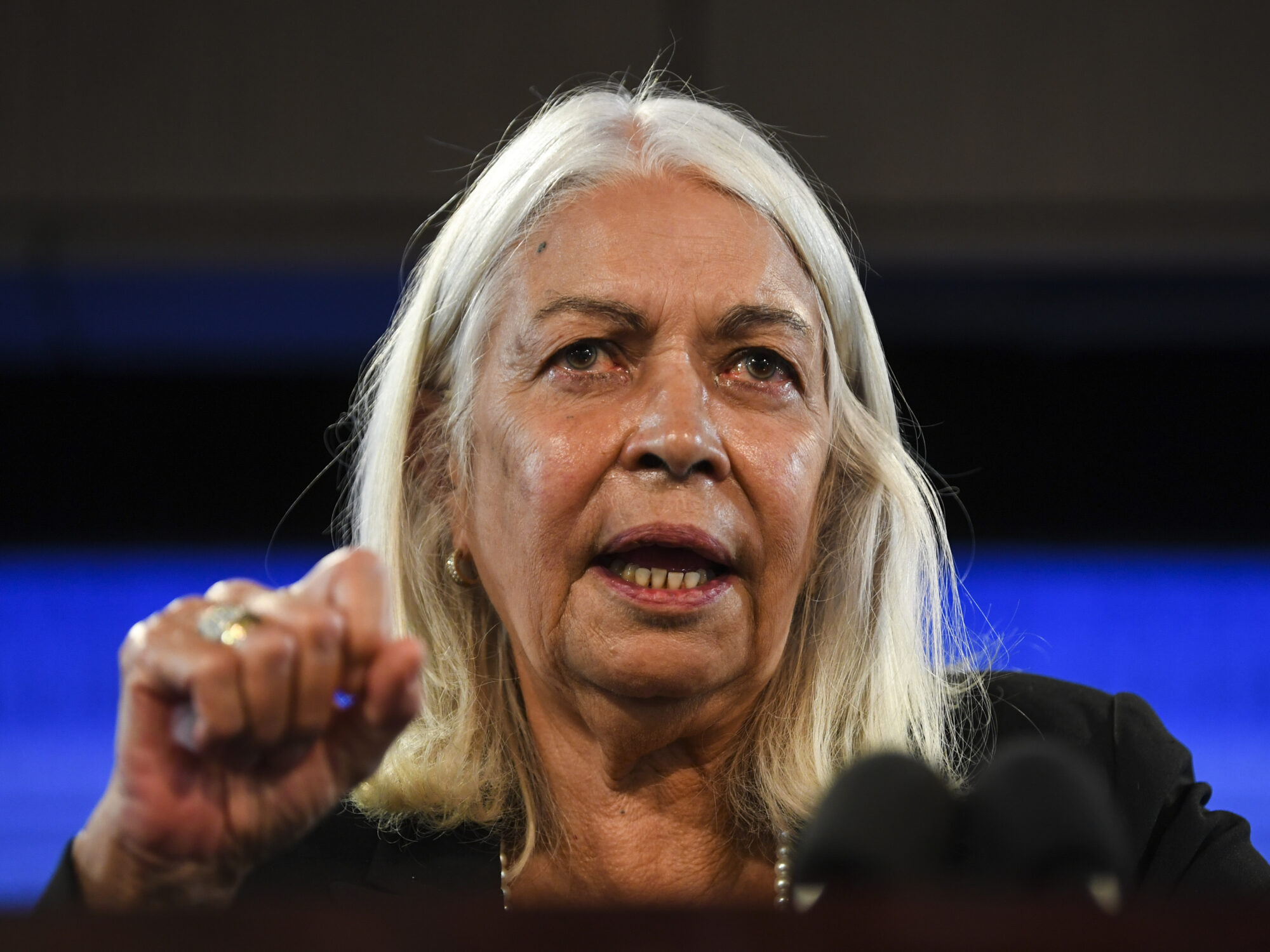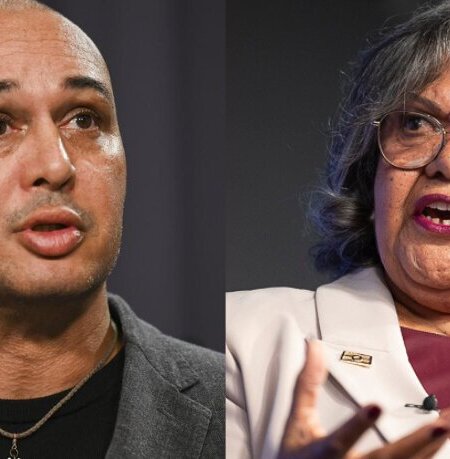At the end of the twentieth century, the public culture of Australia remains, as it has for the previous two centuries, riven by disputes as to the status of Indigenous people in Australian civil society. I argue here that it remains the case that the Australia polity is devoid of a clear and just status for Indigenous people within its ambit. Further, this continuing dispute is a loose hanging thread in the web of our civil society.
The modern nation constituted at Federation in 1901 excluded Indigenous people from the State, and such exclusion continued until the 1960s. In the twentieth century the problem became more acute: Aborigines having been dispossessed, the new state then excluded them from the status of citizen, and Aborigines inhabited a political no-man’s land for nearly seventy years, from 1901 to 1967. The public debates about the place of Aboriginal people in the nation have focussed on the problem of how to incorporate Aboriginal people into the ambit of the nation state by various means: assimilation, integration, self management, self-determination, reconciliation and, throughout years, the call for a treaty could also be heard.
Following legislative reforms in the 1970s, Aboriginal land rights were recognised in statutes. Whereas the lands returned under these statutes were acts of grace by the Crown, the common law recognition of native title by the High Court of Australia in 1992 found customary rights to land that has pre-existed and, under certain conditions, survived British sovereignty. The subsequent codification of native title in the Native Title Act of 1994 aimed, amongst other things, to resolve the retrospective effects of this discovery at law of an underlying title which had the potential to cause the invalidity of titles issues since annexation. The High Court decision in the Wik case found that native title and pastoral leases could coexist, with some qualification, and this finding was the grounds for amendments to the Native Title Act. In breach of international law on acts of racism these amendments substantially stripped Aboriginal people of their customary property rights. It is this sequence of events in the deterioration of Aboriginal rights that has caused Aboriginal people to consider the legacy of the frontier in Australia as a continuing and profoundly racist exclusion of Aboriginal people from the Australian polity.
The doctrine of terra nullius as argued by Justice Blackburn was found by the Mabo High Court to be inconsistent with modern standards of human rights. That judgment relied on the proposition that ‘not only did the civilized nations acquire sovereignty by their “discovery” of lands but the right of inhabitants to continue to possession must receive executive or legislative recognition before it can be admitted to exist.’
However the High Court’s judgment in Mabo and others v. The State of Queensland unanimously confirmed that the validity of the acquisition of sovereignty by the Crown is not justiciable in municipal courts. The acquisition of sovereignty is an Act of State which cannot be reviewed. The decision in Mabo confirmed the position in Coe v. The Commonwealth, and it is now settled law that no challenges to the validity of Australian sovereignty will be entertained before an Australian court. Further, as Noel Pearson observed in his 1993 Evatt Foundation Lecture, ‘as a matter of international legal theory, the validity of the acquisition of sovereignty over Australia by the British Crown is a moot point.’
Even so, it is generally agreed in the literature on this problem that ‘there is no way that the issue will ever be entertained at the international level.’ Further, he explains:
As a matter of law the decision of the High Court in Mabo has established the conflation of sovereignty with land ownership… the law now recognises Aboriginal law as a source of law and as the basis for the Indigenous right to land.
Pearson’s lucid refutation of arguments within the Aboriginal community on issues of sovereignty as a useless diversion was accompanied by his eloquent demand in that lecture for fruitful alternatives to the concept of sovereignty as then argued by the Aboriginal Provisional Government. He conceded, however, that:
…a concept of sovereignty inhered in Aboriginal groups prior to European invasion insofar as people have concepts of having laws, land and institutions without interference from outside of their society. This must be a necessary implication of the decision in Mabo against terra nullius.
Justice Blackburn in Milirrpum v. Nabalco had ruminated on the question of the existence of Aboriginal government, laws, and perhaps, as had Chief Justice Marshall in 1832, the sovereignty of those who occupied the land before British sovereignty when he said:
The evidence shows a subtle and elaborate system highly adapted to the country in which the people led their lives, which provided a stable order of society and was remarkably free from the vagaries of personal whim or influence. If ever a system could be called ‘a government of laws, and not of men’, then it is that shown in the evidence before me.
In accordance with the Mabo finding on native title arising from particular ‘traditional laws and customs’, Pearson suggested that, with the development of standards of human rights relating to Aboriginal people at international law, ‘Recognition of … “local Indigenous sovereignty” could exist internally within a nation-state, provided that the fullest rights of self-determination are accorded.’
He also noted that the Australian state:
…has consistently failed to understand and to accept the right of its Indigenous peoples to be allowed the fullest rights of self-determination. It is little wonder that calls for a separate nation find ready adherents in the Aboriginal community.
Australian judicial decisions on these issues make interesting reading. In the end, it must be concluded that the denial of the existence of Aboriginal nations in Australia by this case law accords our nation the status of an anomaly among the settler colonial states. No treaties or agreements were concluded with Aboriginal people. The monstrous injustice of the seizure and dominion involved, and the lack of consent and treaties, remains a stain on Australian history and the chief obstacle to constructing an honourable place for Indigenous Australians in the modern state. That place must be found beyond the limits of the legal discursive framework that dehumanises and dehistorises Aboriginal people rendering us as the mere wandering brutes of Hobbesian and Rousseauian fame.
In a protracted public debate during the year 2000, following national consultations over a ten-year period, the Council of Aboriginal Reconciliation presented to the Prime Minister John Howard the Draft Document of Reconciliation.
His rejection of this document on the spurious grounds that only ‘practical reconciliation’ can ameliorate the ‘problems of the Aborigines’ has been interpreted as his rigid refusal to recognise Indigenous societies as pre-existing entities with rights and entitlements. His rejection of this innocuous document was followed by a counterproposal from Aboriginal leaders for a renewed treaty commitment. The idea of a treaty between our nations thus requires to be explained, as I hope to do here.
In Australia, there has been an almost comprehensive rejection of the idea that Aboriginal peoples might be self-governing within the limits of Australian law. The exceptions are minor, such as the right to practise narrowly interpreted ‘traditions and customs’ on Aboriginal land in some demarcated areas, some limited rights under local governance statutes, and the narrow recognition of native title under ‘traditional laws and customs’ as pertaining only to the internal incidents of native title in the Native Title Act of 1994. The Australian Law Reform Commission recommended a limited means of recognition by amending some statutes, but the recommendations have largely been ignored. In a limited way, the judiciary has adopted its advice on the relevance of customary law in evidence and sentencing.
So, how can it be explained that native title to land that pre-existed sovereignty and survived it, as the High Court of Australia has explained, has been recognised, and yet the full body of ancestral Indigenous Australian laws and jurisdiction are deemed by a narrow, historically distorted notion of sovereignty to b incapable of recognition.
In this lecture, it is possible only to touch on some of these issues. In setting out some of the evidence here, I provide an interpretation that shows that it was the failure of colonial governments to make treaties with our ancestors and the subsequent body of justification for that failure, both judicial and political, that deprive Australian Indigenous peoples today of the dignity of exercising fully the body of ancestral law in coexistence with the sovereign state. The idea of sovereignty on which this exclusion lies is a fictive account of settlement, a fictive account of dominion and a distortion of more than four centuries of the exercise of sovereignty by the British Crown in the New World.
Of the terra nullius proposition, it was said in Mabo [No 2][469]:
The facts as we know them today do not fit the ‘absence of law’ or ‘barbarian’ theory underpinning the colonial reception of the common law of England. That being so, there is no warrant for applying in these times rules of the English common law which were the product of that theory. It would be a curious doctrine to propound today that, when the benefit of the common law was first extended to Her Majesty’s Indigenous subjects in the Antipodes, its first fruits were to strip them of their right to occupy their ancestral lands.
Thus, I argue that, just as British sovereignty did not wipe away Aboriginal title, neither did it wipe away Aboriginal jurisdiction. Aboriginal government under the full body of Aboriginal customary laws, must by the same logic as the discovery of native title at common law, survive annexation of Australia by the Crown, even if in some qualified way:
The plain denial of justice in the suppression of Aboriginal customary laws and jurisdiction results from the one-dimensional notion of sovereignty that has developed as a defence of the indefensible.
Let me explain what I see as the relevance of treaties to this continuing dispute in Australian society about Indigenous people. I will first consider the nature of treaties; second, the historical uses and characteristics of treaties; third, the history of agreement-making between Indigenous and non-Indigenous Australians; fourth, the debates about a treaty in Australia; and finally, the issues of relevance to our society in this account of treaty-making. [Read the lecture in full and complete Treaty Talks given at the ESORA and NAIDOC Week Forums Treaty! Let’s Get It Right!.]




